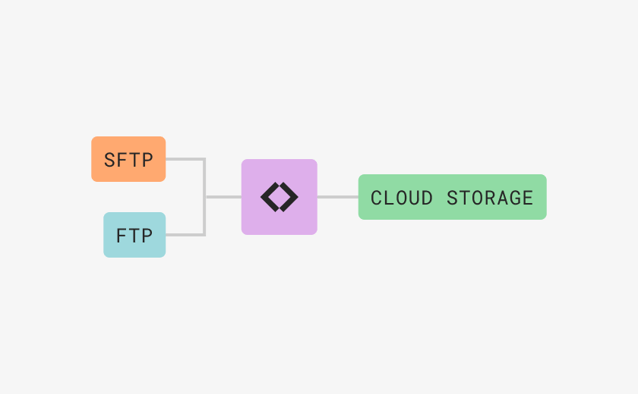What is an SFTP Server?
An SFTP server (or SSH File Transfer Protocol server) is a server that enables secure file transfer, remote file access, and file management over the internet using the SSH protocol. SFTP servers allow clients to securely transfer files between the client and the server using encryption and authentication mechanisms provided by SSH.
In short, SFTP servers provide a simple, secure, and reliable way to retrieve or upload files both automatically and manually.
For a deep dive into SFTP - look at What is SFTP
Key functions of an SFTP Server
All SFTP servers provide the ability to authenticate as a user and send and receive files, but some extend the core functionality to provide a higher level of control, file management, access controls, and auditing.
Here is some of the functionality you can expect from an SFTP server:
-
Security: SFTP servers ensure secure file transfers by encrypting data during transmission, preventing unauthorized access to sensitive information. They use SSH for authentication and encryption, providing robust security features.
-
Authentication: SFTP servers typically support various authentication methods, including password-based authentication, public key authentication, and certificate-based authentication. This allows clients to securely authenticate themselves to the server before accessing files.
-
File Management: SFTP servers provide functionality for managing files and directories on the server. Clients can upload, download, delete, rename, and manipulate files and directories on the server using SFTP commands or client applications.
-
Access Control: SFTP servers often include access control mechanisms to restrict access to files and directories based on user permissions and privileges. Administrators can define access policies to ensure that only authorized users can access specific files and directories.
-
Logging and Auditing: SFTP servers typically maintain logs of file transfer activities, user authentication events, and other relevant information for auditing and compliance purposes. This allows administrators to monitor and track file transfer activities on the server.
-
Compatibility: SFTP servers are compatible with a wide range of client applications and operating systems, making them versatile solutions for file transfer and remote file access in various environments.
How do I connect to an SFTP server?
To connect to an SFTP server, you need a client and some connection details. The client is the piece of software that you are using to upload and download files from the SFTP server with.
For example:
When connecting, you will need the following from your SFTP server provider:
- Hostname (IE: sftp.couchdrop.io)
- Port (port 22 most of the time)
- Username and Password
- SSH key (optional)
 Discover the best SFTP / FTP client for Windows, Mac, Linux, Android and iOS.
Discover the best SFTP / FTP client for Windows, Mac, Linux, Android and iOS.
What are some common SFTP servers?
There are many SFTP servers available today. Most SFTP servers can be installed on a Linux or Windows server relatively easily. These servers then listen on port 22 for incoming connections and provide access to the underlying file system on the server.
Some commonly installed servers:
- Bitwise SFTP Server
- VSFTPD
- OpenSSH
OpenSSH is installed and deployed on 95% of devices today - so it's normally the best choice.
What is Cloud SFTP?
Cloud SFTP refers to SFTP services hosted and managed by a third-party provider, delivered as a SaaS (Software as a Service) solution. Instead of installing and maintaining your own SFTP server infrastructure, cloud SFTP providers handle the hosting, security updates, scalability, and maintenance.
Cloud-hosted SFTP servers offer several advantages over traditional self-hosted installations:
- Reduced infrastructure overhead: No need to provision, configure, or maintain physical or virtual servers
- Automatic scaling: Storage and bandwidth can scale up or down based on your needs
- Built-in redundancy: Cloud providers typically offer high availability and disaster recovery features
- Simplified management: Web-based interfaces replace complex server administration
- Integration capabilities: Many cloud SFTP services integrate with cloud storage platforms (AWS S3, Azure Blob, Google Cloud Storage) and other business tools
- Compliance and security: Managed security updates, certifications, and compliance features
Cloud SFTP is particularly useful for organizations that need secure file transfer capabilities without the technical overhead of managing their own server infrastructure, or those looking to bridge traditional SFTP workflows with modern cloud storage systems.
Looking for a cloud SFTP solution? Couchdrop provides enterprise-grade cloud SFTP with seamless cloud storage integration and advanced file transfer automation.